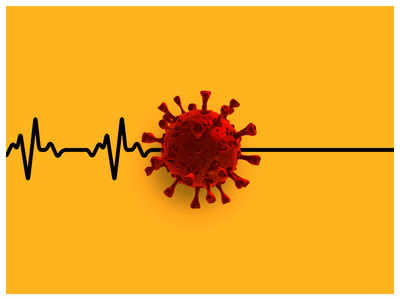- News
- lifestyle
- health-fitness
- health-news
- The matter of the heart: How to protect your heart during the coronavirus pandemic
Trending
This story is from September 29, 2020
The matter of the heart: How to protect your heart during the coronavirus pandemic
There is a surge in heart patients coming to hospitals for treatment and follow-ups. Not only the delay in treatment or follow-up due to fear of the COVID-19 infection, but the pandemic has also severely affected the heart and lung health of the infected patients. Many patients developed several heart problems such as Cardiomyopathy, which goes on to prove that heart and lung patients are highly vulnerable to COVID-19 infections.

Heart and pandemic
We all know at least one person who has succumbed to a heart issue. Cardiovascular diseases (CVD) affect people across ages and it is not surprising that it is the leading cause of mortality in India. One in 4 deaths in India happens because of CVD with ischemic heart disease and stroke responsible for most deaths.
The COVID pandemic, which was initially believed to impact the lungs, did some potent damage to the heart too.Dr Yugal K Mishra, Chief of Clinical Services, Head of Cardiac Sciences and Chief Cardio Vascular Surgeon, Manipal Hospitals, Dwarka, New Delhi agrees, “We are now witnessing a surge in heart patients coming to hospitals for treatment and follow-ups. Not only the delay in treatment or follow-up due to COVID-19 fear, but the pandemic has also severely affected the heart and lung health of the infected patients. Many patients developed several heart problems such as Cardiomyopathy. Heart and lung patients are highly vulnerable to COVID-19 infections. We recently saw two infected persons in Chennai and Hyderabad who had earlier undergone lung transplant. Hence, we are suspecting that COVID-19 severely affects heart and lung health.”
Dr Sushant Patil, Senior Consultant, Cardiology, Heart Centre, Nanavati Super Speciality Hospital adds, "Evidence suggests that COVID-19 has a significant impact on patients with cardiovascular disease and the effects being multifaceted. Factors like reluctance to seek help due to lack of assurance that safe in-hospital wards will be provided to non COVID patients, increased workload on ambulance services, diversion and prioritisation of hospital resources, have resulted in significantly decreased access to cardiovascular services along with late presentation of patients to the hospital, often too late to benefit from lifesaving treatments. Patients with COVID-19 infection are more prone for blood clots formation, rhythm abnormalities, heart attack, stroke, heart failure."
How to care for the heart
“The most significant advice I can share is that recent studies have indicated that being even slightly overweight is a major risk factor across age groups; obesity isn't just a cosmetic concern. It is a medical problem that increases your risk of other diseases and health problems, such as heart disease, diabetes, high blood pressure and certain cancers. So measure your weight daily- and try and be as close to your ideal weight as possible; maintaining a BMI (Body Mass Index ) between 18.5-24.9.”
An increasing number of people are experiencing stress and having negative thoughts because of the lockdown, which is not good for the heart. It is very important to stay calm and be positive. Yoga in the mornings can be a great balancing factor for all. Maintain your social network even remotely and communicate with your friends and family on a regular basis.
“It is also important to continue taking all your medications as advised, making sure that you do not run out of stock. Avoid going to the doctor’s clinic for a routine follow-up or if there is no urgent matter. You can always consult your doctor on the phone,” stresses Dr Panda.
Is work from home hurting the heart?
Professionals working from home are sitting longer than usual and also binging due to the added stress.
Studies have proven that even for those who exercise, sitting for long periods is associated with worse health outcomes including heart disease , Type 2 diabetes and cancer. Even if you’re doing 30 minutes per day of physical activity, it matters what you do the other 23 hours of the day.
There is consensus about a threshold of about 10 hours of sitting. Research shows that if you hit more than 10 hours, your cardiovascular risk really goes up.
Moreover, there is a tendency to overeat when you’re at home. Don’t stock junk food around and prepare small healthy meals. When you eat, focus on eating- don’t be distracted by electronics.

Healthy daily practices everyone should follow
It is important to monitor your blood pressure, blood sugar, cholesterol, and triglycerides with regular self-monitoring.
Brush your teeth twice a day
Have medicines regularly.
Work towards a goal that keeps you occupied; such as knitting, painting.
The diet control has to be stricter since the level of physical activity is less.
It is very important to stay calm and be positive and believe that this too would pass.
Avoid using smoking and alcohol as coping mechanisms. Talking to friends and family would help in dealing with this stress.
5 simple exercises that you can do through the day
When it comes to exercise, experts suggest that interval training is best for your heart, which alternates short bursts of high-intensity effort with longer stretches of less-intense activity.

Interval training forces your heart to alternate between working hard and recovering. Doing that multiple times in a single workout can help your heart become more efficient. You can choose a good interval training program online or work with your instructor to know what's best for you.
Dr Panda suggests 5 simple exercises:
You must get up every half an hour and exercise for one minute to ensure that the body remains active.
Touch the ceiling: While marching in place, push your palms and thumb up towards the ceiling. Make it harder by holding water bottles.
Hamstring curl: Bend arms at the elbow. Bring one foot up toward your rear end while straightening your arms so that your hands are down when your foot is up.
Walk while using the phone
Knee lift: These are just like hamstring curls, except that you lift your knee up in front as your arms go down.
Desk pushup: Place your hands on the edge of the desk, shoulder-width apart, with legs out behind you. Push off with as much force as you can.
Take care of the heart
Dr. Vidyadhar S. Lad, Consultant - Adult Cardiac Surgery & Heart, Transplantation, Kokilaben Dhirubhai Ambani Hospital, Mumbai says, "The fear of COVID-19 amongst people is preventing them from seeking timely medical attention during these unprecedented times. As a result, patients with cardiovascular emergencies delay in seeking help after they have developed complications. The message on World Heart Day this year is, “Use your Heart to beat the Heart disease”. So let us listen to our heart and understand what it takes to keep it healthy. Let us act in ways to protect our heart and of those who are vulnerable from the novel coronavirus, by seeking timely treatment if needed. An ounce of prevention is worth a pound of cure."
The COVID pandemic, which was initially believed to impact the lungs, did some potent damage to the heart too.Dr Yugal K Mishra, Chief of Clinical Services, Head of Cardiac Sciences and Chief Cardio Vascular Surgeon, Manipal Hospitals, Dwarka, New Delhi agrees, “We are now witnessing a surge in heart patients coming to hospitals for treatment and follow-ups. Not only the delay in treatment or follow-up due to COVID-19 fear, but the pandemic has also severely affected the heart and lung health of the infected patients. Many patients developed several heart problems such as Cardiomyopathy. Heart and lung patients are highly vulnerable to COVID-19 infections. We recently saw two infected persons in Chennai and Hyderabad who had earlier undergone lung transplant. Hence, we are suspecting that COVID-19 severely affects heart and lung health.”
Dr Sushant Patil, Senior Consultant, Cardiology, Heart Centre, Nanavati Super Speciality Hospital adds, "Evidence suggests that COVID-19 has a significant impact on patients with cardiovascular disease and the effects being multifaceted. Factors like reluctance to seek help due to lack of assurance that safe in-hospital wards will be provided to non COVID patients, increased workload on ambulance services, diversion and prioritisation of hospital resources, have resulted in significantly decreased access to cardiovascular services along with late presentation of patients to the hospital, often too late to benefit from lifesaving treatments. Patients with COVID-19 infection are more prone for blood clots formation, rhythm abnormalities, heart attack, stroke, heart failure."
How to care for the heart
Dr Ramakanta Panda, leading cardiac surgeon and vice chairman of Asian Heart Institute, Mumbai feels that it is important for people to follow the age-old trio of 45 minutes daily exercise, a balanced diet, and positive mindset to keep their heart healthy.
“The most significant advice I can share is that recent studies have indicated that being even slightly overweight is a major risk factor across age groups; obesity isn't just a cosmetic concern. It is a medical problem that increases your risk of other diseases and health problems, such as heart disease, diabetes, high blood pressure and certain cancers. So measure your weight daily- and try and be as close to your ideal weight as possible; maintaining a BMI (Body Mass Index ) between 18.5-24.9.”
An increasing number of people are experiencing stress and having negative thoughts because of the lockdown, which is not good for the heart. It is very important to stay calm and be positive. Yoga in the mornings can be a great balancing factor for all. Maintain your social network even remotely and communicate with your friends and family on a regular basis.
“It is also important to continue taking all your medications as advised, making sure that you do not run out of stock. Avoid going to the doctor’s clinic for a routine follow-up or if there is no urgent matter. You can always consult your doctor on the phone,” stresses Dr Panda.
Is work from home hurting the heart?
Professionals working from home are sitting longer than usual and also binging due to the added stress.
Studies have proven that even for those who exercise, sitting for long periods is associated with worse health outcomes including heart disease , Type 2 diabetes and cancer. Even if you’re doing 30 minutes per day of physical activity, it matters what you do the other 23 hours of the day.
There is consensus about a threshold of about 10 hours of sitting. Research shows that if you hit more than 10 hours, your cardiovascular risk really goes up.
Moreover, there is a tendency to overeat when you’re at home. Don’t stock junk food around and prepare small healthy meals. When you eat, focus on eating- don’t be distracted by electronics.

Healthy daily practices everyone should follow
It is important to monitor your blood pressure, blood sugar, cholesterol, and triglycerides with regular self-monitoring.
Brush your teeth twice a day
Have medicines regularly.
Work towards a goal that keeps you occupied; such as knitting, painting.
The diet control has to be stricter since the level of physical activity is less.
It is very important to stay calm and be positive and believe that this too would pass.
Avoid using smoking and alcohol as coping mechanisms. Talking to friends and family would help in dealing with this stress.
5 simple exercises that you can do through the day
When it comes to exercise, experts suggest that interval training is best for your heart, which alternates short bursts of high-intensity effort with longer stretches of less-intense activity.

Doctors recommend physical activity, yoga and maybe some music to calm the mind and body.
Interval training forces your heart to alternate between working hard and recovering. Doing that multiple times in a single workout can help your heart become more efficient. You can choose a good interval training program online or work with your instructor to know what's best for you.
Dr Panda suggests 5 simple exercises:
You must get up every half an hour and exercise for one minute to ensure that the body remains active.
Touch the ceiling: While marching in place, push your palms and thumb up towards the ceiling. Make it harder by holding water bottles.
Hamstring curl: Bend arms at the elbow. Bring one foot up toward your rear end while straightening your arms so that your hands are down when your foot is up.
Walk while using the phone
Knee lift: These are just like hamstring curls, except that you lift your knee up in front as your arms go down.
Desk pushup: Place your hands on the edge of the desk, shoulder-width apart, with legs out behind you. Push off with as much force as you can.
Take care of the heart
Dr. Vidyadhar S. Lad, Consultant - Adult Cardiac Surgery & Heart, Transplantation, Kokilaben Dhirubhai Ambani Hospital, Mumbai says, "The fear of COVID-19 amongst people is preventing them from seeking timely medical attention during these unprecedented times. As a result, patients with cardiovascular emergencies delay in seeking help after they have developed complications. The message on World Heart Day this year is, “Use your Heart to beat the Heart disease”. So let us listen to our heart and understand what it takes to keep it healthy. Let us act in ways to protect our heart and of those who are vulnerable from the novel coronavirus, by seeking timely treatment if needed. An ounce of prevention is worth a pound of cure."
End of Article
FOLLOW US ON SOCIAL MEDIA








